Disclaimer
I've received plenty of comments about this post, and I want to be clear that harvesting wild eggs isn't legal, or easy to do. Even if you do find some, they're likely beyond the point of consumption your used to, and you won't want to eat them.
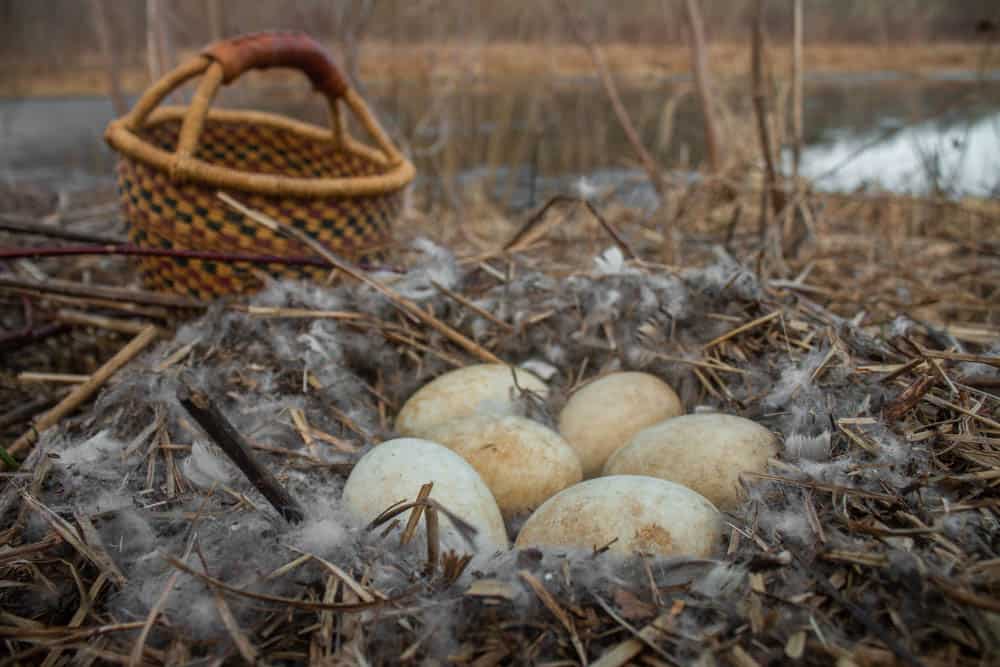
Original Post
Where I live, and around the country, wild poultry are just about everywhere: ducks, turkeys, quail, swans, pheasants, woodcock, grouse, and many more.
One species I'm acutely aware of right now in the spring, as much for the honks and flying Vs, is our native Canada Geese, Branta canadensis.
One thing geese and all the other birds share (they’re poultry after all) is that they make nests, and lay eggs. Today, I'm thinking about wild eggs, specifically wild goose eggs, and the legality of gathering them for culinary purposes, as well as the sustainability.
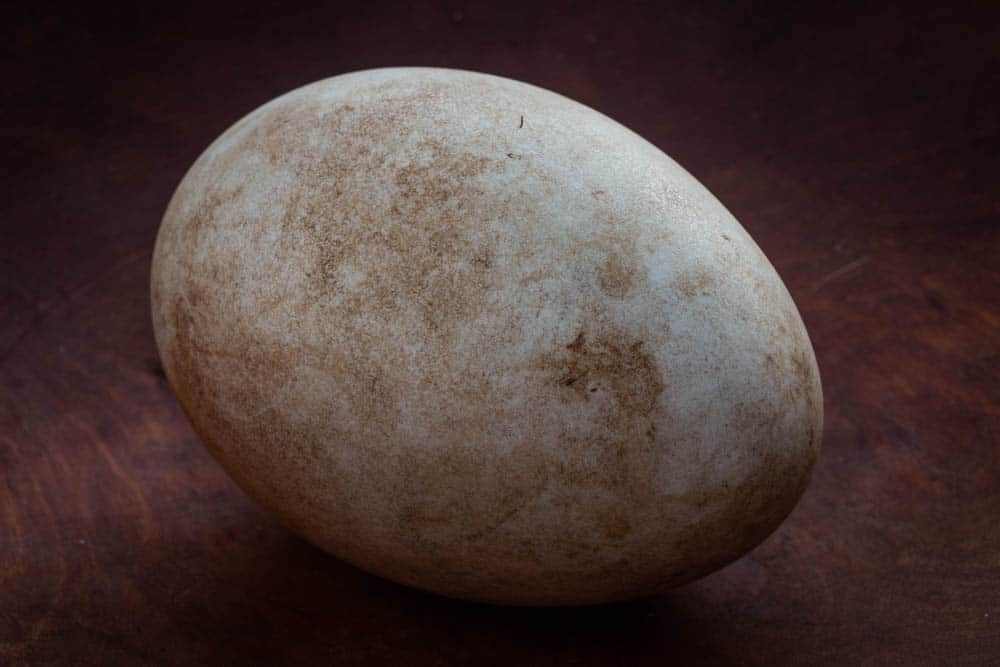
I’ve researched the topic a bit over the past few years, interviewing conservation officers from the Minnesota and Wisconsin Departments of Natural Resources (DNR), as well as a couple professional hunters and anglers. Maybe you'll find it interesting.
Humans have probably harvested eggs as a food source as long as we’ve hunted and tended poultry for food. The Romans were said to hold peacock eggs higher than all others.
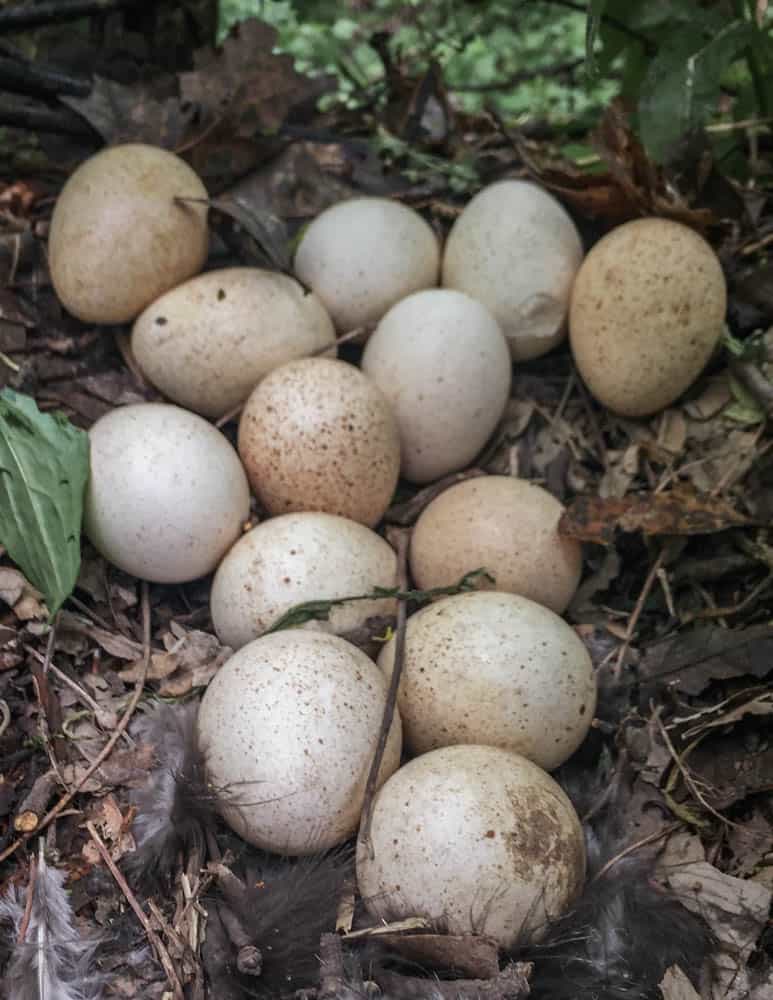
In North America, we eat mostly chicken eggs, but there’s a veritable kaleidoscope of egg colors, patterns, and sizes out there. Duck eggs are generally twice the size of chicken eggs, with a higher proportion of yolk to white, making them extra rich and perfect for baking; goose eggs are similar.
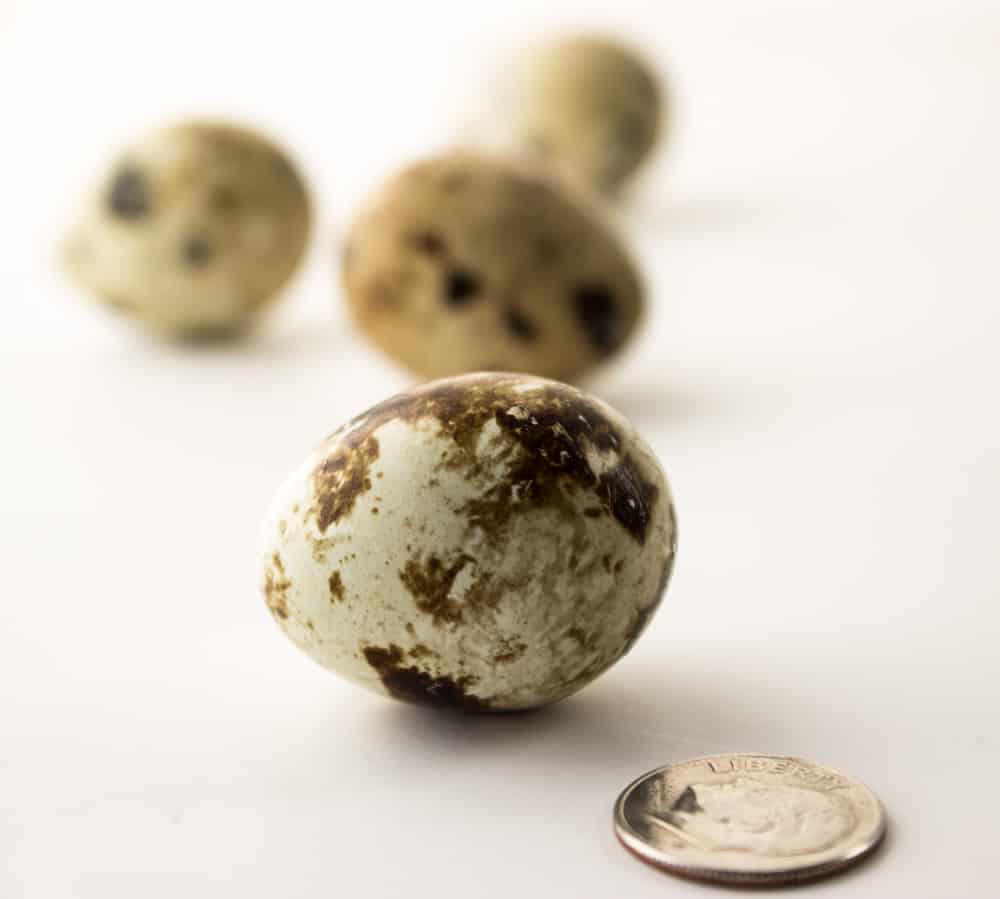
Migratory Bird Treaty Act (MBTA)
One thing that’s certain in the United States, though, is that all the eggs we eat come from commercial operations, and that it is illegal to harvest the eggs of wild birds without a permit.
The Migratory Bird Treaty Act of 1918 (MBTA) is the law that makes it illegal to harvest wild eggs, although some hunters have told me it would be violating the Lacey Act, which may be true, although that law was made to combat trafficking, not harvesting, per se.
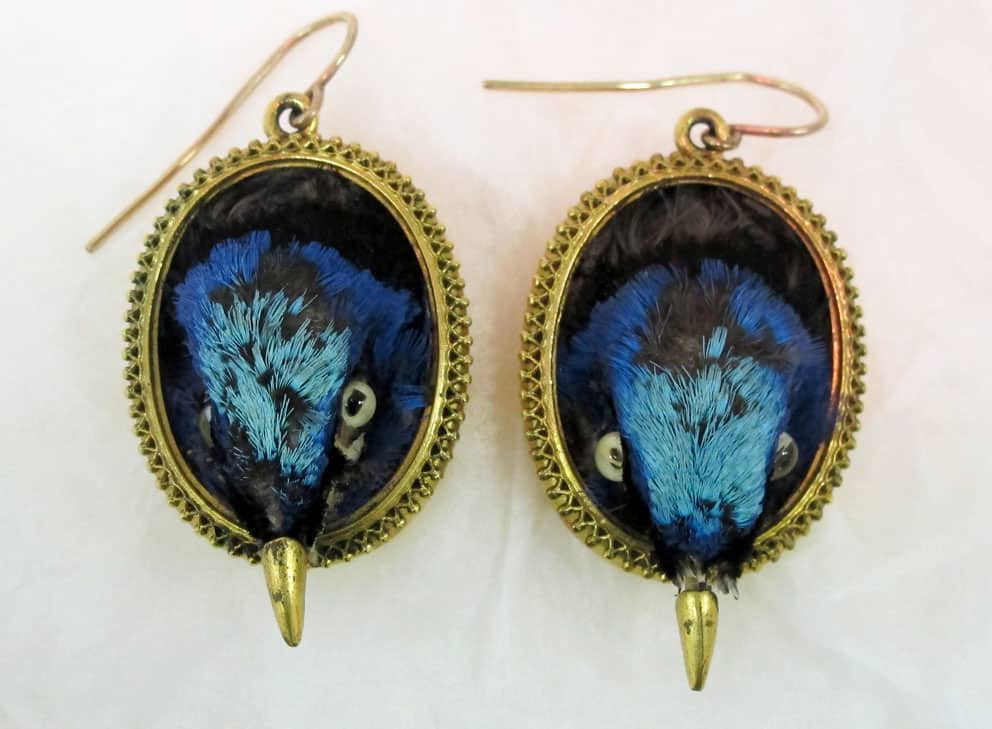
The MBTA was created in an era when Americans were slaughtering birds for things like feathers and commercial goods.
The MBTA’s benefits to legions of birds is undeniable, and has likely saved certain species from extinction, like the majestic Sandhill Cranes that fly above the hills of western Wisconsin each spring, and the Sesame Street-worthy Snowy Egret.

I might never have contemplated harvesting wild eggs if it weren’t for an entry in Chef Magnus Nilsson’s book, Faviken, about harvesting puffin eggs.
After reading that, I posted a few questions in local hunting forums online about harvesting wild eggs, and I was quickly met with fire and brimstone like some ignorant heathen.
People asked me if I was an idiot, just plain stupid, and other things I won’t mention here. Mostly, I got single-sentence replies to my questions along the lines of, “THAT’S ILLEGAL!”
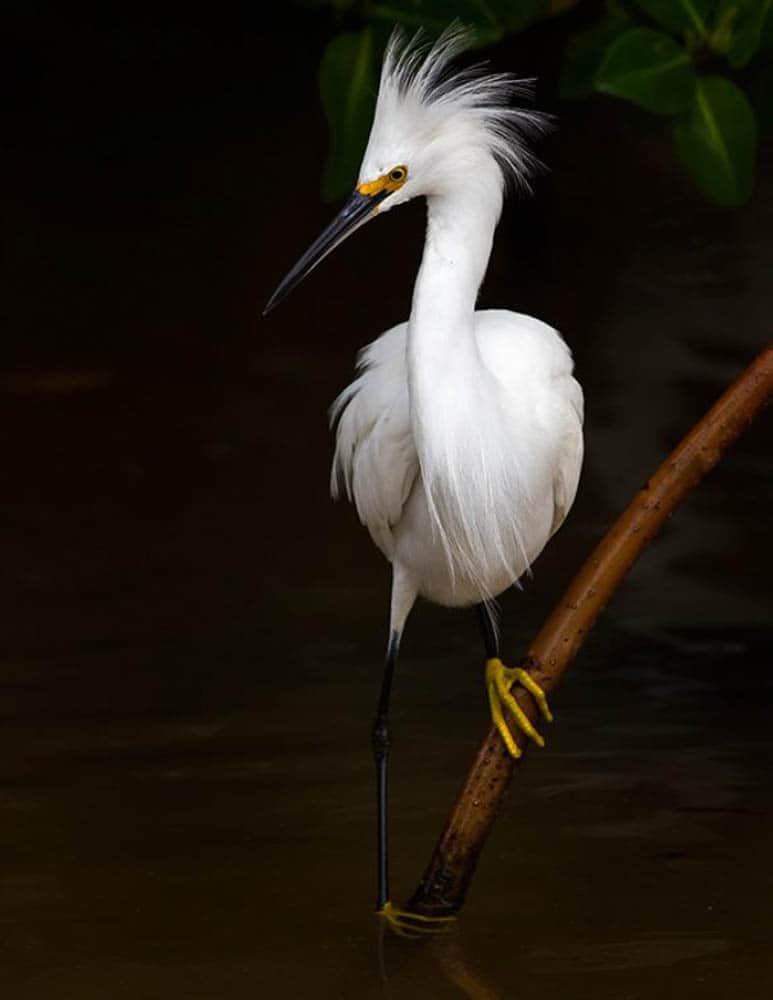
I just couldn't understand it. Why was it so wrong for me to be curious about harvesting and eating wild eggs?
Re-nesting
I want to steer this in the direction of wild geese, but to do that, I think it's helpful to consider the chicken. If you’ve ever harvested eggs from a chicken coop, you’ll know that you can do so regularly. So, what happens when you take a wild goose egg from a nest?
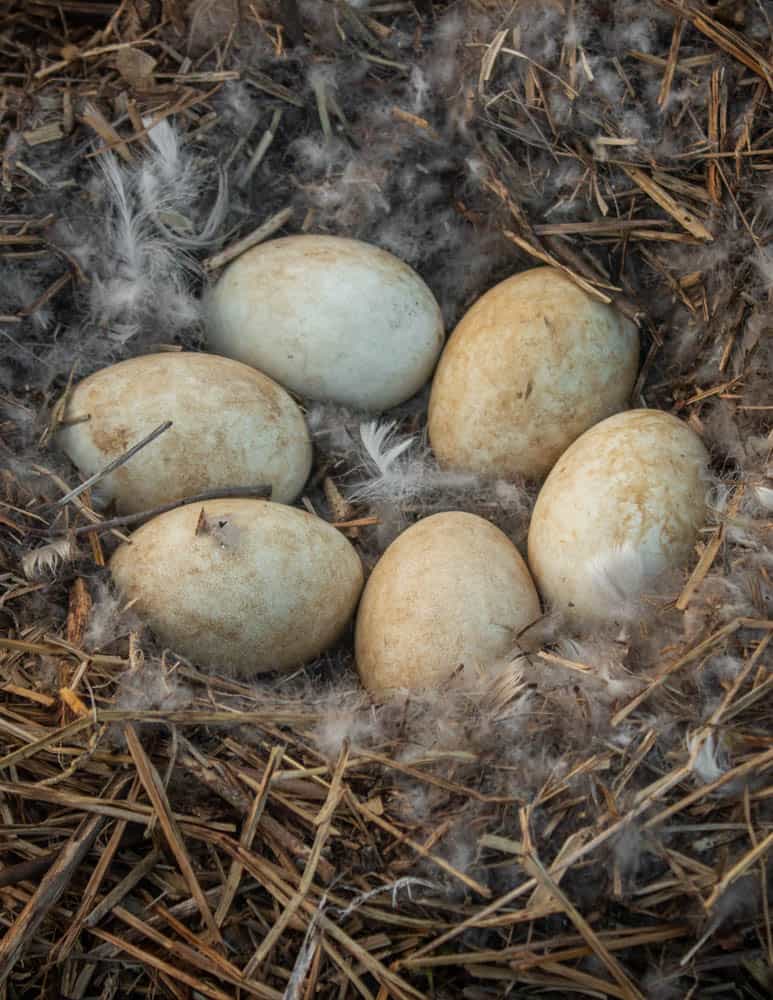
Just like with chickens, when you remove an egg from a nest, more eggs get laid. The goose has the ability to keep making eggs, but, if some eggs are removed, geese—unlike chickens—follow their instinct and move the nest to a new, safer place in a process called re-nesting.
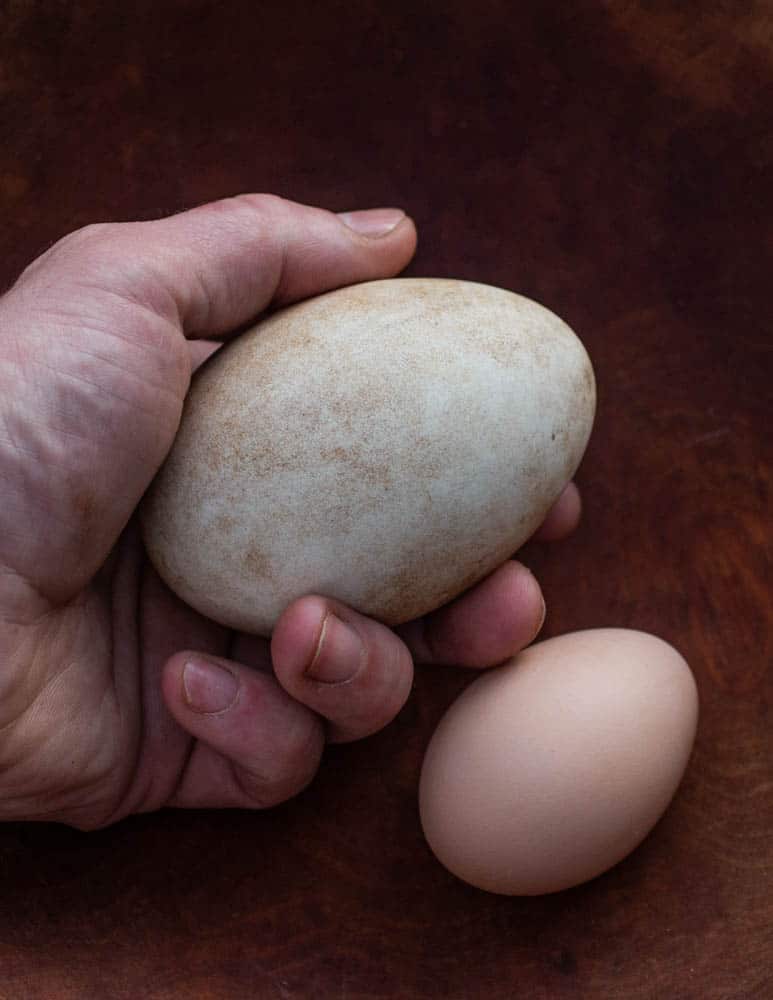
One authority in the hunting community told me of a study done with Wood Ducks kept in captivity, in which an egg was removed from the ducks’ nests daily for more than 60 consecutive days.
I can’t find a link to the study, so consider this anecdotal evidence, but it’s plausible, and logical when considered alongside the egg-laying rates of commercially raised poultry.
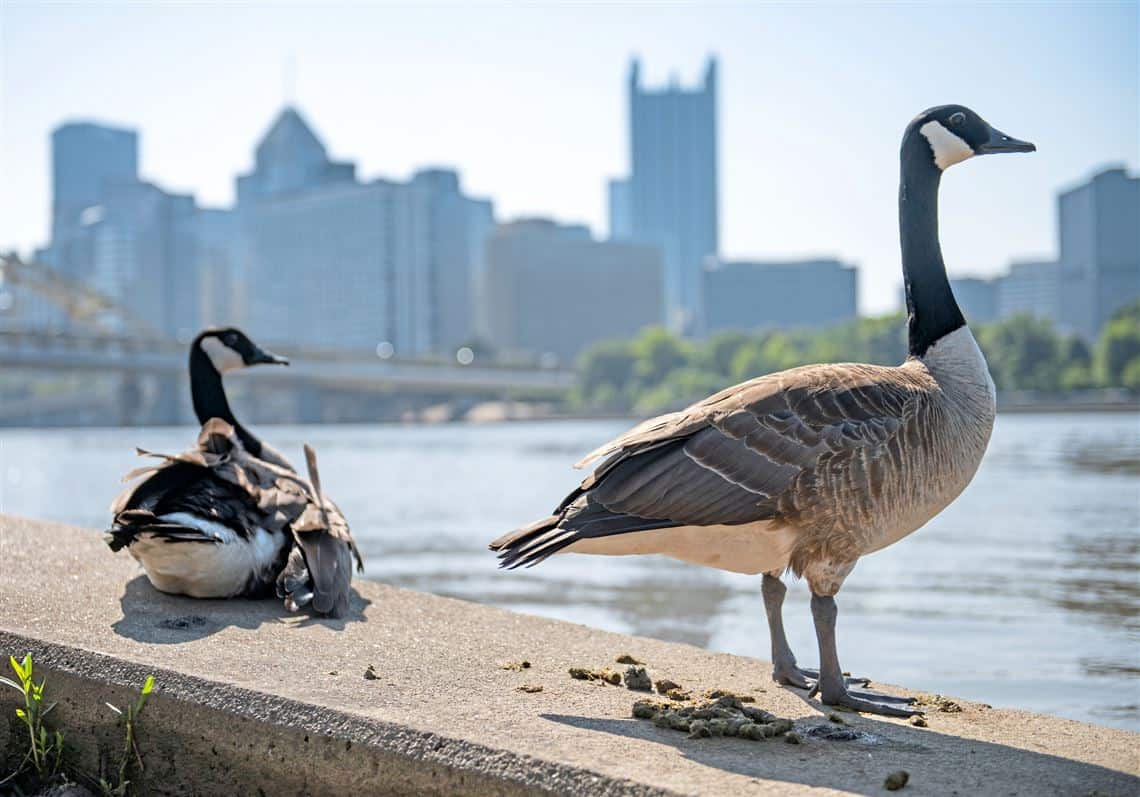
Canada Geese
At one point in time, Canada Geese were over-hunted. From what I can gather, that was more than 100 years ago.
A lot can change in 100 years, and now in some places, especially urban areas, people might say the population of Canada Geese is out of whack. Some of the geese apparently no longer migrate, but still remain covered under the law for migrating birds.
“In the 1930s, the federal government released giant Canadian geese — the largest subspecies of Canadian geese — into the wild to try and compensate for over-hunting, but because they were bred in captivity, once they were released they didn’t take up the migratory patterns of other Canadian geese,” according to Wisconsin Public Radio.

Culling of Geese and Eggs
As I see it, the law as it applies to wild geese is a little outdated. There’s a hunting season for Canada Geese, but most hunters I know don’t love them (for the record, they taste ok, but benefit from slow cooking or other special treatment—corning and smoking can be good).
In some urban and suburban areas, overpopulation of resident, non-migrating geese means they get culled en masse, since having too many geese, especially in areas with water, can contribute to eutrophication of the water, leading to algae overgrowth that has a cascade effect on other creatures in the water. Geese can also be aggressive, especially when protecting a nest.
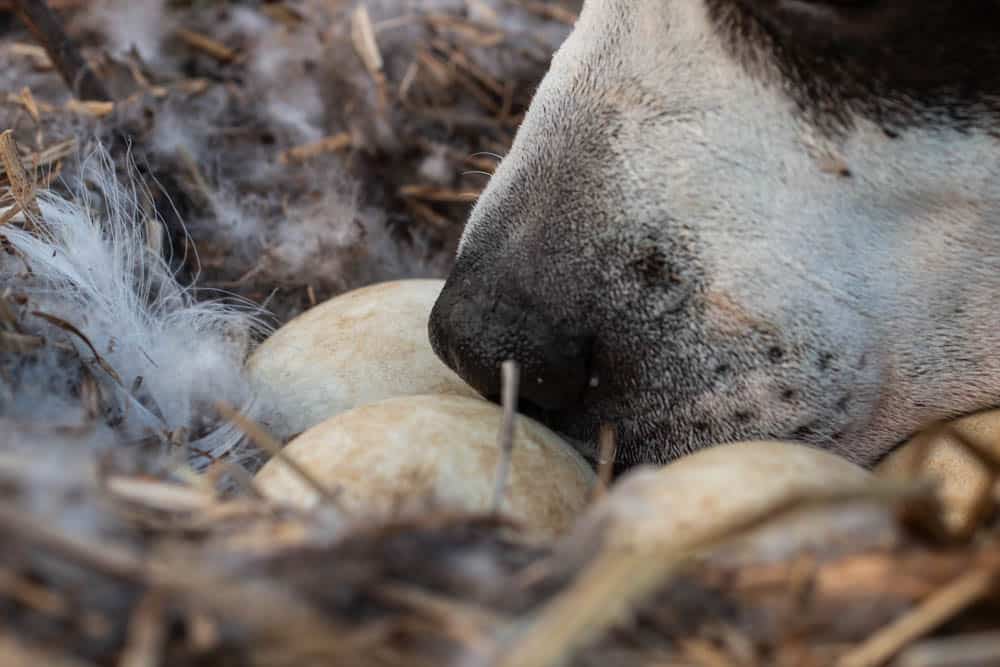
If a goose is making a nest in your yard and attacks your toddler, you as the landowner can apply for a permit to destroy the eggs, which you would do by coating the eggs with vegetable or other oil, which effectively asphyxiates the embryo by preventing respiration through the porous shell.
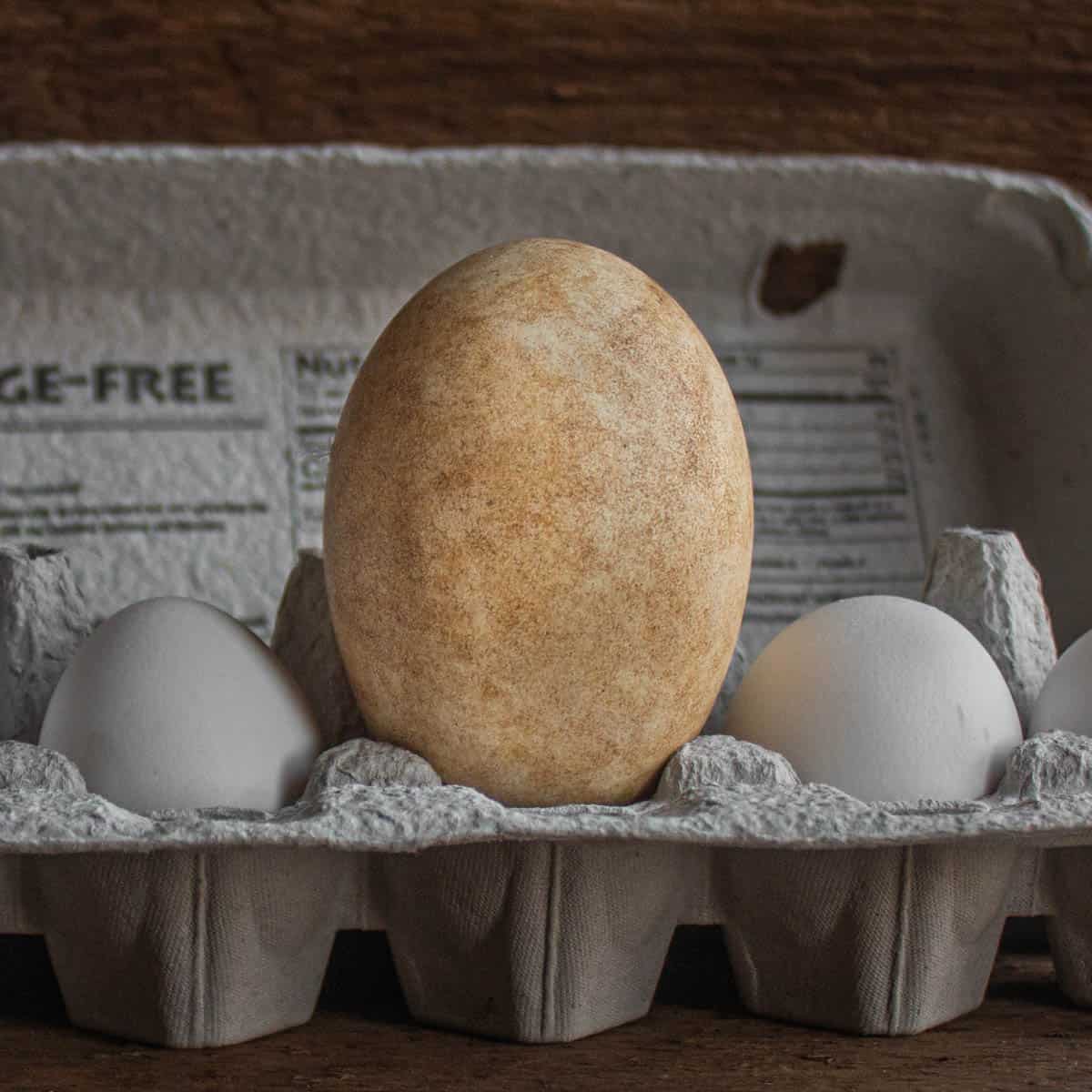
Oiling eggs is a widely used practice, and was recommended to me by both conservation officers I spoke to, since the goose will not re-nest if the eggs are oiled.
Harvesting those same eggs to make an omelet, though, would still be a felony, and there is no permit you can apply for to do so, at least in Minnesota and Wisconsin at the time of this writing.
To me, I think it's odd you can get a permit to destroy wild goose eggs, but you can’t get a permit to eat them (special exceptions are made for indigenous populations in places like Alaska). At the end of the day though, the law is clear that it's illegal to harvest wild eggs, so get your goose eggs from a local farmer.
Revisions to the MBTA
Apparently big business and lobbying have no problem subverting bird laws to their wants. Unfortunately, I know no omelet lobbyists.
2017: “A new interpretation of the law by the U.S Government will no longer hold industries accountable for ‘incidental’ bird deaths under the law.
This legal opinion prevents enforcement of all incidental take, removing incentives for companies to adopt practices that protect birds from threats such as oil waste pits. It also eliminates penalties for companies that kill substantial numbers of birds, including from large oil spills,” according to the Audubon Society.
This means I could be charged with a felony and serve time in prison for making an omelet, but a giant company like BP, after incidentally killing 1,000,000 or more birds in the Deepwater Horizon Spill in the Gulf of Mexico in 2010, would face no charges. In 2021, a new administration reversed this decision, stopping the reinterpretation of the law from going into effect.
Birds Not Protected by the MBTA
The MBTA excludes birds with unprotected status, such as pigeons and starlings. But, these birds lay very small eggs, and the nests may be hard to reach, such as in the rafters of a barn.
Resources
Lacey Act of 1900 (combatting bird trafficking)
Wildlife Protection Act Explained (Audubon Society)
2021: Government Tosses out the 2018 revisions to the MBTA
Deepwater Horizon Spill Kills over 1 Million Birds
Birds to which the MBTA does not apply
WPR Culling Canadian Geese: A Necessary Practice
Birds Strike Causes Plane to Land
A Hat Tip to the Women Who Started Modern Bird Conservation in the U.S.


zidane
thank you for the article
Carmella
Since I have gotten geese, my pond has not had an algae bloom, prior was only ducks. They seem helpful at this point. I do love eating a goose egg, but I will stick to the domesticated kind. In the state of NC, it's illegal to disturb a nest of a migratory bird.
Don Blackert
Loved your recent article on wild eggs. We sometimes have pen raised pheasants and quail and collect the eggs. We also have a “goose problem” and need to keep them away from the pond this time of the year or they will establish a nest and crap all over the dock, beach area, and everywhere else. Chasing them away is legal, as is oiling the eggs, but as you state, eating the eggs is not. I’d like to point something out to you relative to the paragraph from near the end of your article, referring to the Migratory Bird Treaty Act (MBTA).
The interpretation of the MBTA was changed to accommodate windmills, not oil pits. Oil companies have been fined and required to make restitution for bird deaths and injuries for decades. The enforcement worked and they virtually eliminated open oil pits. The “new interpretation” arose when it became clear that windmills killed large numbers of birds, especially raptors, that virtually never land on oil pits. Ducks did land on oil pits occasionally and oil pits are virtually non-existent at modern well sites. and when they are it is very temporary during drilling when the site is occupied, and most birds are kept chased away by the human activity. I have recently retired (last month) from a 40- year career as an environmental engineering consultant (call me fully free to forage at will). I’ve had clients in the oil and refining industries who had to hire veterinarians to clean and care for ducks and geese that landed on oil pits (back when oil pits were common). I once watched the release of 2 geese that had been cleaned and cared for at significant expense. It was at a refinery near Toledo, Ohio and it was goose season. The land near the refinery is flat corn fields and pit blinds were common and the sound of shotguns was frequent. So - 2 geese landed on an oil pond, were caught and cared for and the refinery paid significant fines in addition to veterinary bills, and the birds were released into an environment where it was perfectly legal to shoot them. I think you get the point. Sort of like your questioning why we can oil eggs but not eat them. Meanwhile the interpretation of the MBTA had to be changed because windmills (and solar collectors like Ivenaph in California) were killing multitudes of birds including golden and bald eagles.
If I could take another minute of your time, I like to make one point that tangentially relates to foraging. I assume from the double reference to oil pits as bird killers that the impression is that fossil fuels are bad and green energy is good. I live in the Marcellus shale region of Pennsylvania. About a half mile from my farm there is a group of 9 horizontal natural gas wells. All 9 wells are contained on a pad of about 2 acres. They drill down 8,000 feet then the well turns horizontal for a mile or more. The pad is dead silent, re-vegetated, and barely noticeable. It produces far mor energy than if every ridgetop in sight and every south slope was entirely covered in windmills and solar panels. I can look across the landscape and not even notice the well pad. I’d hate to have to see the results of an equivalent amount of energy produced by the bird, bat, and habitat destroying alternative “green” energy – which in my opinion is as far from environmentally conscious as you can get. Consider the habitat under a solar array – It is essentially a dead zone – sterile. Shade causing vegetation and solar arrays are not compatible. No foraging there, for you, me, or anything wild. Wipe out the oaks and “plant” wind and solar, and then run power lines. No thanks.
Alan Bergo
Don, thanks for commenting, plenty of valid things to consider here.
Will K.
Interesting topic. I know the British have a season for collecting certain seagull eggs. I've personally never harvested wild eggs, but I was once gifted some duck eggs, and they make a delicious omelette.
Karen
While I appreciate the point you make, can you imagine the burden on law enforcement? Further, creating an exotic egg market might be fun in the beginning, but where would it lead? Consider ginseng. Heck, how about just trying to keep friends from outing your best morel hunting areas! Then there is trespassing.... as a land owner who has posted No Trespass signs every 20’, I’m still liable for you falling and getting hurt when you do criminally trespass. No, I agree with your basic premise, but 10yrs out, what would it look like? How far will people go? Poaching. Personally and unfortunately, I think it must be kept illegal and basically, manageable. If certain species became a viable and profitable market I’m sure someone would already be commercially filling orders with large production coops.
Nothing really goes to waste in Nature. Similar to antlers- which small animals slowly naw away at for the calcium.
As for any bird that stops migrating, like the double crested cormorant, they become a menace. (But when we build private stocked lakes and feed the ducks, we are the ones making social degenerates out of them. -Me included!)
But thats just my opinion. Great article though. A real thought provoker!
Alan Bergo
Thanks Karen. I don't think it will ever be an issue, honestly. The fact remains it is silly for a law to allow us to destroy goose eggs, but not even consider edible options (taking fully into account that eating goose eggs would probably not work in mitigating them in areas where they can be a nuisance). I just think it would be fitting for goose and turkey eggs to have harvesting permits. No one is trying to create an exotic egg market here, goose and turkey eggs are already sold commercially.
Linda Bryan
Yes, I know this is somewhat off topic, but wanted to add another historical note...
Have read a manuscript at Minn. Hist. Soc. that describes an early 19th century person on a canoe voyage up St. Croix River (between today's Wisc. and Minn.) who would stop at each island in the river and forage on the down-river sand bar for turtle eggs. He carried a pail and something to disturb the sand. Apparently he was very determined to find eggs, according to the writer.
I've wondered how foragers treated eggs that contained chicks and little turtles, however developed.
Alan Bergo
That's super interesting. Reptilian eggs are another story entirely. In Costa Rica they're a highly appreciated bar snack, and unfortunately regularly poached, so much so that the authorities now put fake GPS eggs in turtle nests to locate poachers.
ViolaBlue
Love the historical researching you do. It adds such depth to your articles.
G. Fisher
The irony with the Canada goose (branta canadensis) is that they are often outright killed by authorities as a pest animal. Some eastcoast college recently got some bad press for instructing campus security to club them to death.
STEVE DENAULT
Hey Alan
Here in Manitoba we had to add a 2021 March hunt for Giant Canada's to cull them: likely due to lobbying by Aircraft and Auto Insurance industries. There are so many of them, they are everywhere urban and rural.
It begs the questions as to why we aren't allowed to harvest the eggs. Wouldn't that be more effective than hunting.
Side note: its hard to beat the wild goose breast for jerky making and also for making Corned Beef or Pastrami. Pickle in a brine for a week, then simmer for a couple hours and man that is great tasting corned goose for sandwiches, with mustard of course. Also do a 12 hour overnight breast in consume at 200 F, makes amazing pulled meat, tastes like pulled beef, maybe better.
I've had duck eats, ever so rich, can't wait to try Goose eggs. Imagine an egg salad ar deviled egg (:
Alan Bergo
Thanks Steve. I don't think egg harvesting would really do much for the population, I just think it's kind of silly that I can destroy things but not have a chance to eat them.
Jacqui
Horseradish - better than mustard with the corned goose.
Steve
Would love to have the brine recipe as I harvest geese and make use of all the meat 🥩
Abbie
It is dulling to the mind (brain) to eat eggs in any form.
Alan Bergo
Are you on drugs? I'm much more fearful of having a B-vitamin deficiency, personally.
Ben Rosen
Also you get points for inclusion of a baby yoda picture.
lisa
But--but--but--even if you DO collect non-domestic bird eggs, how would you know what stage of development they'd be? A drop of blood is one thing, but a half-formed egg is, well, balut?
Alan Bergo
This post was long enough, and specifics on egg development are beyond the scope of what I'm discussing here. Egg hunting is a learned skill, like many other things.
Patty Glines-Kotecki
Great, article- and very timely! I was just talking with friends about how duck and goose eggs are now “in season” and the question arose about harvesting wild goose eggs. Thank you!
Alan Bergo
Thanks Patty.
Ben Rosen
Also making the feathers illegal fits into the same type of thought as what banning Ivory does . With ivory if you have it has to be from way before the ban . Also need documentation to have it for the most part .
Ben Rosen
Interesting article you wrote . It certainly food for thought . Something to consider also is that not all birds have the same mating and egg laying cycle so it’s more difficult for them to reproduce. Also lot of domestic and animals and destruction of nesting areas hinder this . Where I grew up in Long Beach , NY. One year at the beach in the parking lot of the beach . This rare odd bird which I can’t remember decided to make its nest in a Parking spot . The bird were protected by federal parks and wildlife officers until they hatched because they couldn’t be moved. I think it’s certainly would depend on the species and quantity . Though I work for the government at the airport and we see all kinds of people trying to smuggle bird feathers , ivory , conch shells etc . Unfortunately greed always gets in the way . Not everyone considers the ethics as you do .
Alan Bergo
Thanks Ben. I think we should consider things on a species by species basis. We can probably all agree that Bald Eagle omelets would be blasphemous. Geese and turkey eggs, being already raised commercially as food are more appropriate I think.
Ben Rosen
Lol agreeed .
David Griggs
Great article on wild harvesting eggs. But it made me think of the great southeast Asian/Filipino snack, balut. And the corresponding practice of candling eggs.
For that matter, you only mention avian eggs. What about reptilian eggs, such as turtle eggs or alligator eggs? Or if you happened to be in Australia, the eggs of duck billed platypus or spiny echidnas.
Thanks for making me think,
Dave
PS I'm not a big fan of eggs, I'll stick to boring old ramps and fiddle heads.
Alan Bergo
Thanks David. Reptilian eggs are a different story with different caveats, especially in how they cook (you won't be making deviled eggs with them). Trying to include them would have made this post way too long, and it was a bit too long already. I'll cover them when I have time to edit my images of them and speak to my local DNR, maybe later this year. For the record, I eat a lot of things, but balut disgusted me.
Laura
All this resonates so much!! Thank you for presenting some reasoned thinking around these issues. I also find it confounding that it is illegal to possess feathers of any birds, even from roadkill - except of course birds that are hunted for game.
Alan Bergo
Thanks Laura, yes, the possessing of feathers thing is another odd holdover I don't agree with. It should be taken on a species by species basis.
Daryl
Species by species for sure, and considering that laws like that were also put into place as a way to stomp out Indigenous traditions is another reason to question them.
Alan Bergo
Daryl, the indigenous traditions is a great point. If you have a specific reference I can add please let me know. Thanks.
Gabi H
Goose sausage is a must if you haven't tried it yet, I bought a shotgun specifically to hunt Canadian geese after tasting it.
Alan Bergo
I could definitely see that. Not really practical for commercial, plucked geese but for honkers that sounds great. Good way to control/moderate their flavor, which a lot of people don't like.
Deb
I would point out 3 things:
1) Your perception of the abundance of geese is not necessarily the reality of their population as a whole, and doing research on their actual numbers should form your opinion on introducing a predator.
2) People raise domestic geese for eggs. A key part of this practice means getting as many eggs as possible each season. As such, we harvest the eggs as often as possible, and get a maximum of around 45 eggs per season. Those numbers are from geese specifically bred to make many eggs. I would not expect a wild goose to re-nest more than twice in a season, and the average number of eggs in a Canadian goose's nest is 5, so I'd be shocked if anyone got more than 15 or 20 eggs out of a Canadian goose. As a result, there's too narrow a margin between harvesting and overharvesting.
3) Permits allowing one to destroy goose eggs are extremely situational, as you described, so if the law was changed to allow for eating instead of destroying, actual opportunities would be very few and far between. How often does a wild goose nest close enough to a home or play structure to bother the landowner?
Alan Bergo
Great points Deb, thanks for commenting.